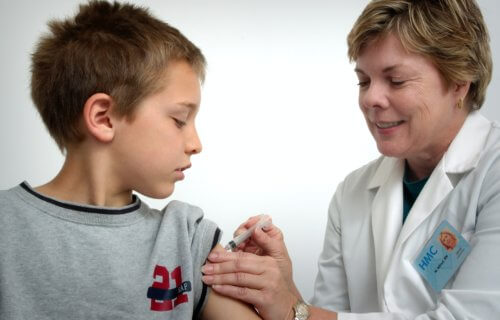HUDDERSFIELD, United Kingdom — Coronavirus vaccinations for children between five and 11 are something parents have been calling for since the initial vaccine rollout. While those shots are now available in the United States, other countries like the United Kingdom are taking a much slower approach. Now, a researcher from the University of Huddersfield is explaining why parents may actually want to hold off on vaccinating their young children against COVID-19.
The new study argues that rolling out a mass immunization program for children between five and 11 years-old will not provide the best outcomes for children in terms of both effectiveness and safety.
“Often scientist and public health professionals fear that discussing these issues openly may undermine vaccine uptake,” says Dr. Hamid Merchant in a university release, “but, it’s time that we explain the vaccine science and the differences between various vaccine formulations as a number of vaccine products are now approved by the regulatory agencies. We shouldn’t rush with a one-size-fits-all approach, particularly when there is a product out there which would be of greater benefit to children.”
COVID variants make the current vaccine less effective
Specifically, the doctor explains that children were less susceptible to the original SARS-CoV-2 strain that emerged in early 2020. Since then, COVID has mutated several times, creating new variants which are putting children at greater risk of contracting the virus.
“Currently deployed COVID vaccines were designed using the variant that was prevalent in early 2020 and the virus has significantly mutated since then; the breakthrough cases from recent Omicron outbreak is a good example of the rapidly evolving nature of this virus,” Merchant writes in the Journal of Pharmaceutical Policy and Practice.
“The currently deployed novel COVID vaccines may still provide protection against a severe disease, risk of hospitalization, admission to intensive care and death, albeit not common in children. COVID vaccines will, however, not provide the children the protection from catching the virus in the first instance nor will prevent minor illness; and it will not reduce the risk of community spread either.”
The study author adds that young children who contracted COVID-19 during the Omicron outbreak in January 2022 now have natural immunity to the virus, which will protect them against reinfection and severe illness.
Nasal vaccines better than injections?
Dr. Merchant also notes that standard intramuscular vaccine injections (a shot in the arm) don’t produce mucosal antibodies. This refers to the immune system’s response in the mucosal membranes of the intestines, the urogenital tract, and the respiratory system. Studies continue to show that COVID primarily attacks a patient’s lungs and respiratory tract.
The study points to the annual flu vaccine’s inability to provide robust protection against the virus. However, that changed when school started using nasal flu jabs for children between two and 17 years-old.
“Several clinical trials confirmed the superior efficacy of nasal flu vaccine over the injectable flu vaccine in preventing infections in children from as young as 6 months to 17 years,” the study author writes.
Dr. Merchant suggests that parents could potentially wait until a successful nasal vaccine for COVID comes out.
“Nasal route of delivery will have much safer profile when it comes to adverse events associated with injectable vaccines as it will minimize the risks of vaccine distribution to distant tissues post administration. The nasal delivery is also cost-effective for mass immunization campaigns in children, it also offers an improved children and parents’ compliance.”

